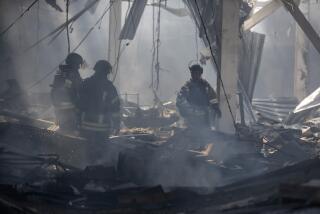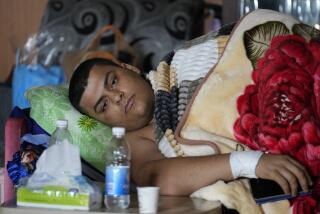Violence Surges in Contested City of Kirkuk
- Share via
KIRKUK, Iraq — A surge in violence in this oil-rich city divided among Kurds, Sunni Arabs and Turkmens vying for power has alarmed Iraqi officials amid intensifying sectarian warfare in central and southern Iraq.
Kirkuk has been contested ground since the 2003 U.S.-led invasion of Iraq, when Kurds displaced by Saddam Hussein and previous Sunni Arab-dominated governments began returning to their former homes.
Sunni Arab political leaders believe the Kurds are trying to push them out of the northern city and intend to annex it to the Kurdish region of Iraq.
Kurds believe that Kirkuk is part of a greater Kurdistan and that they have a historic claim to the city.
American officials have encouraged the groups to work out their differences politically. And by Iraq’s standards, Kirkuk has remained relatively peaceful. But the number of bombings, assassinations and other attacks has risen sharply, both in Kirkuk and smaller cities around it, Iraqi officials say.
So far this month, at least 84 people have been killed in Kirkuk and surrounding areas.
A new report by the International Crisis Group, a Brussels-based think tank, calls on the international community to step in to resolve the “mounting tensions” in Kirkuk or risk full military conflict in the city.
The United Nations should begin to negotiate a compromise under which Kirkuk and the surrounding countryside would become an area separate from the Kurdish region to the north, the report says.
Kurdish-dominated security forces have been the targets of several deadly attacks that officials believe were carried out by Sunni Arab insurgents.
Car bombers and snipers have also hit police and army checkpoints and patrols outside the city.
On Wednesday, six police officers and four civilians were wounded when a roadside bomb was detonated near a security patrol in southern Kirkuk.
In response to the rising violence, the Iraqi army announced that it had begun an operation targeting insurgents in Rashad, west of Kirkuk.
The offensive was planned by Iraqi forces, an Iraqi army official said.
“This region has lately witnessed escalations of armed attacks against the security forces and Iraqi civilians,” the official said.
The official, who asked that his name be withheld because he feared for his family’s safety if he was publicly identified, said Iraqi and American troops were participating in the offensive.
But U.S. military officials in Baghdad said they were not aware of the operation.
Rashad was the scene of an attack on an Iraqi army checkpoint this month that left a dozen dead, police officials said. Iraqi authorities believe the Sunni insurgent groups operating in the area may also be responsible for some of the attacks in Kirkuk.
The violence in Kirkuk and surrounding cities has been increasing since the death of militant leader Abu Musab Zarqawi, local authorities said.
Five car bombs have been detonated in Kirkuk since the U.S. airstrike that killed the Al Qaeda in Iraq leader on June 7, Iraqi officials said.
Kirkuk police say the rising violence is the result of a campaign by Sunni insurgent groups to erode Kurdish residents’ sense of security.
Some Sunni Arab leaders blame the United States for the rise in violence, saying U.S. troops have moved some Iraqi security forces out of volatile parts of the region, leaving the areas without adequate police or army protection.
Rakan Saeed, a Sunni Arab politician, said that Iraqi security forces had been withdrawn from Hawija, an Arab city outside Kirkuk, and should be moved back to counter the rising violence.
“The area needs more police elements,” Saeed said, “especially the places that see increased terrorist activity.”
Attacks in Hawija have killed at least eight Iraqi police officers.
Saeed accused the U.S. military of failing to properly train or equip the Iraqi army and police units stationed in the majority Arab towns that surround Kirkuk.
He and other politicians in Hawija have called for the security forces in the areas around Kirkuk to be mostly Sunni.
U.S. military officers have contended that they are trying to create an integrated force in the area. The American officials in Kirkuk have been suspicious of Saeed, a charismatic strongman, believing that he consolidates his power by denouncing the U.S. military presence in the area.
Under Hussein, the Iraqi government intensified a long-standing Baghdad policy of “Arabization” of Kirkuk and the surrounding Al Tamim province. Kurdish families were driven out of the city and countryside and Sunni Arab families were moved north to take their place. Provincial maps were redrawn to bolster Arab population numbers in oil-rich areas.
Hussein believed that his control over Iraq’s northern oil fields would be secure only if there was a Sunni Arab majority in Kirkuk and its countryside. The city, once majority Kurd with a sizable minority of Turkmens -- who are ethnically related to the Turks -- became far more Arab.
Although Kurds still claim a majority in the city, American officials estimate it is roughly one-third Kurdish, one-third Turkmen and one-third Sunni Arab. The Iraqi Constitution, approved by voters last year, postponed a decision on the future of Kirkuk. The constitution says a referendum must be held by the end of 2007 to determine whether Kirkuk should be part of the Kurdish region.
Sunni Arabs believe their rights will be protected if Kirkuk remains outside the control of the Kurdish region.
Kurdish leaders in Kirkuk are determined that their people be in the majority before that vote.
In its report, the Crisis Group called for the referendum to be postponed and said holding it next year would heighten tensions further.
“Within a year, therefore, Kurds will face a basic choice,” the report says: “to press ahead with the constitutional mechanisms over everyone’s resistance and risk violent conflict, or take a step back and seek a negotiated solution.” Each side sees itself the victim of the violence, Kurds because they are attacked by Sunni Arabs, Sunni Arabs because they believe the Kurds are trying to push them out, and Turkmens because they feel unjustly caught in the middle.
On July 10, a car bomb killed three when it exploded outside the offices of the Patriotic Union of Kurdistan, a Kurdish political party.
The city has also seen an increase in political assassinations, security officials said. Both Turkmen and Kurdish political leaders and their families have been targeted in the attacks.
But not all attacks have been overtly directed at political figures or security forces.
On Wednesday, an improvised explosive device exploded in downtown Kirkuk, the second recent attack on a cafe, a police official said.
The bomb, which one witness said was hidden in a nylon bag, killed three people and injured 19.
“We were passing by the Kirkuk Appeals Court, then a big explosion rocked the place,” Mohammed Kadhim said. “We rushed to the scene and saw civilians injured and others killed.”
The cafe bombings appear designed to increase the perception of danger and chaos in Kirkuk, thus dissuading people from returning, especially Kurds living in the more peaceful north.
Times special correspondent Windawi reported from Kirkuk and staff writer Barnes from Baghdad.
More to Read
Sign up for Essential California
The most important California stories and recommendations in your inbox every morning.
You may occasionally receive promotional content from the Los Angeles Times.













